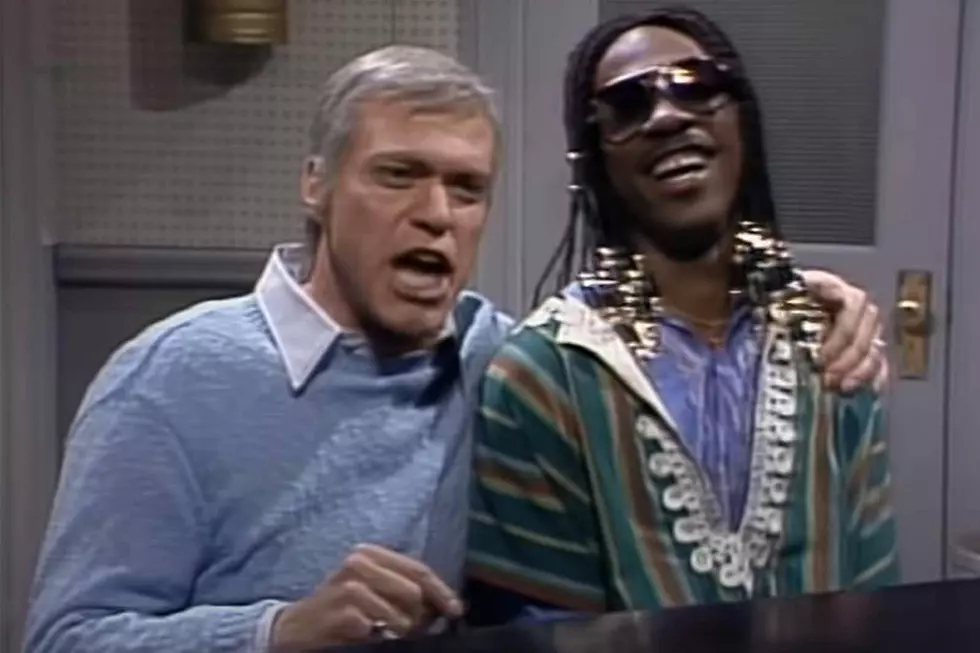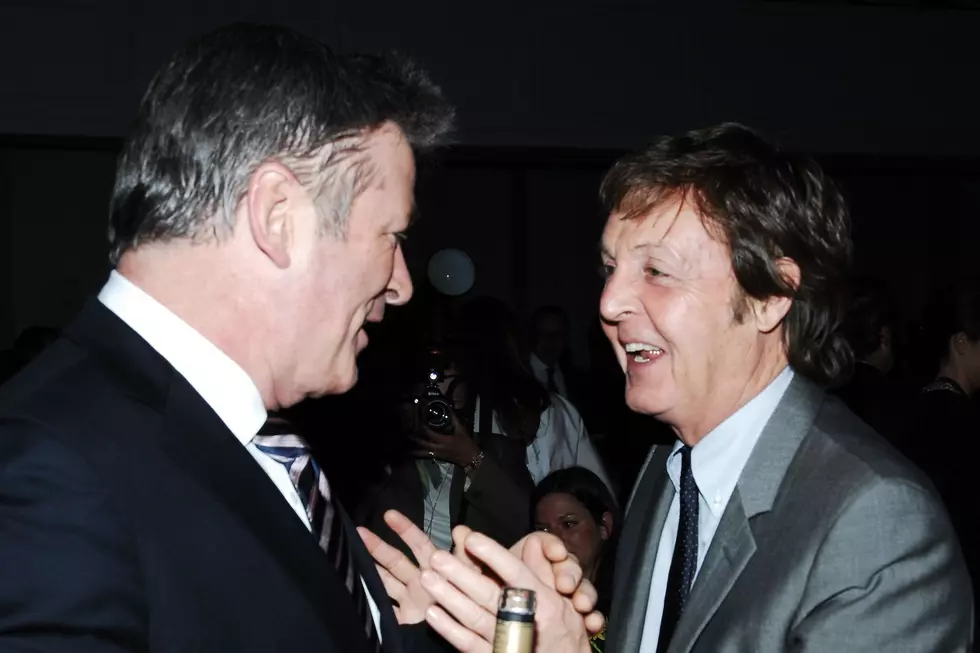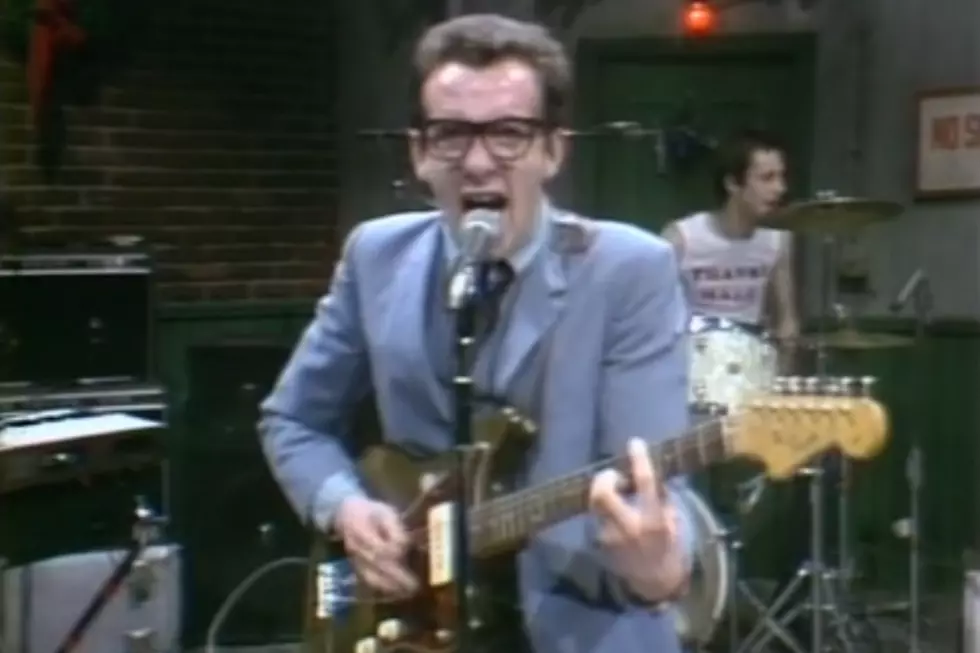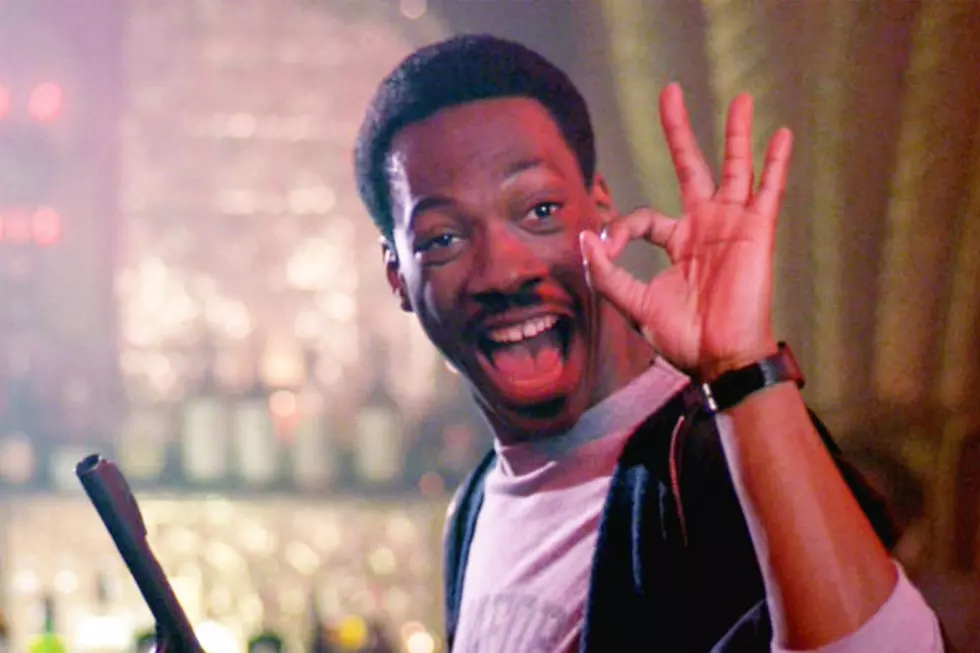
When Eddie Murphy and Joe Piscopo Teamed Up to Take Down ‘Ebony and Ivory’
As a song, “Ebony and Ivory” may not have aged well, but, on the May 22, 1982, episode of Saturday Night Live, the treacly Paul McCartney and Stevie Wonder duet gave two of the show’s biggest stars one of their biggest hits.
With the cloyingly rosy musical paean to black-white relations having come out just that March, SNL writers Barry Blaustein and David Sheffield knew they had the perfect Stevie Wonder for a parody sketch in Eddie Murphy. Murphy, well on his way to becoming one the biggest stars in the show’s history, did a killer Wonder, but had teased it only once, doing a wordless pantomime of the expressive singer on Weekend Update when still a featured player. (He’d break out the impression for the third and final time when Wonder himself hosted in 1983.) For the two writers, the question was which musical superstar would make the perfect comic match for Murphy.
They didn’t have far to look. The seventh season of SNL had fewer go-to impressionists than at other times in the show’s history, but nobody was fonder of the wigs and prosthetics than Joe Piscopo, and nobody had to ask the ever-eager Piscopo twice to bring back Frank Sinatra. New Jersey native Piscopo had been doing a creditably funny Sinatra for a few years on the show and had honed his Sinatra’s smoothly boorish banter and baritone crooning to a fan-favorite edge. Even if, as noted in the SNL oral history Live From New York, Piscopo’s worship of his musical idol sometimes bordered on the obsessive.
Watch Eddie Murphy Debut His Stevie Wonder Impression on SNL
Indeed, when Blaustein and Sheffield pitched what became one of the funniest team-ups in Murphy and Piscopo’s fruitful time on the show, Piscopo initially objected to the idea that Sinatra would be waiting for Wonder in a recording studio, insisting, “Frank wouldn’t do that.” Longtime SNL writer Bob Tischler, in Live From New York, says bluntly of Piscopo’s slavish identification with Sinatra, “It was sick,” while fellow writer Andrew Smith notes how the show eventually came up with the game show “What Would Frank Do?” in response to Piscopo constantly torpedoing sketches that made fun of his hero.
As it tuned out, Sinatra did wait for Wonder, as Piscopo’s crooner confides in a recording technician that he’s looking to reach out to new audiences. “I wanna do some tunes the young people will enjoy,” Piscopo’s Sinatra states boldly, adding, “That's why I’m calling this album, Frank Sings Tunes the Young People Will Enjoy.” It’s a gentle prod at Sinatra’s later career doldrums, with Piscopo (who’d nervously reached out for — and received — Sinatra’s blessing after his initial outing as the singer) softly ribbing Sinatra’s infamous ego.
It's when Murphy enters as Wonder, complete with dashiki, beaded braids, shades and Wonder’s signature smile and weaving head movements, that the crowd switches immediately from appreciation to excitement. With Sinatra pitching alternative lyrics to “Ebony and Ivory” written by Sinatra’s favorite songwriter Sammy Cahn, the sketch continues to lightly lampoon Sinatra for being out of touch, as he assures Wonder that the facile piano-key metaphor in the hit song (“Ebony and Ivory” spent seven weeks at No. 1 on the Billboard chart) is too brainy for the masses.
Referring to McCartney as “the Beatle kid, what's his name, the one that looks like a broad,” Piscopo’s Sinatra belts out his own even more tone-deaf version, which kicks off with, “Life’s an Eskimo Pie, let’s take a bite!” Then it’s Murphy's turn, as he, solicitously led to the piano by Piscopo’s Sinatra, sings the opening to “Ebony and Ivory” with such uncanny confidence that the live audience goes from titters to full-on applause before Sinatra cuts him off to object, “Something tells me that this is more than a song about playing the piano.”
Watch SNL's Frank Sinatra and Stevie Duet on 'Ebony and Ivory'
As protective as Piscopo infamously was of his Sinatra, the sketch finds a slyly insightful tone in addressing the real Sinatra’s uneasy relationship with race. Sinatra was a legitimate advocate for civil rights by boycotting segregated venues during his career, even as he and the other white Rat Pack performers reliably made racially insensitive jokes onstage at the expense of lifelong pal Sammy Davis Jr. In addition, Sinatra, in 1981, defied an international boycott to play concerts in apartheid-era Sun City.
It’s there where the sketch finds its Sinatra, a perhaps well-intentioned but patronizing schmoozer unable to see his blind spots as he improvises revised lyrics like, “That was groovy thinkin’, Lincoln, when you set them free.” Meanwhile, Murphy, as he was every week during his time on Saturday Night Live, is magnetic, his Wonder’s consummate professionalism and goodwill emerging in a spirited improvisation of his own.
“I am dark and you are light,” Murphy sets up Sinatra infectiously, only for Piscopo’s Sinatra to come back with a full-throated, “You are blind as a bat and I have sight / Side by side, you are my amigo — Negro — let’s not fight.”
The trajectories of Piscopo and Murphy were intersecting at this point. Piscopo was essentially the only reliable laugh-getter hired in the disastrous post-Lorne Michaels era of the show, and Doug Hill and Jeff Weingrad’s book Saturday Night shows how Piscopo was initially a friend and even protector to the overlooked younger Murphy. By the time of this episode (with host and musical guest Olivia Newton-John), Murphy was ascendant (the December 1982 release of 48 Hours would make him a superstar), and the way that the audience jolts awake at Murphy’s appearance shows the difference between enjoyment and enthrallment. If Joe Piscopo was a showbiz technician, Eddie Murphy was a star.
With the duet ending with Wonder’s “You are white,” answered by Sinatra’s “You are Black, and who cares!," it’s a delightful comic denouement that, yet, reasserts the sketch’s central themes. Piscopo’s Frank Sinatra may be well-conceived, but it’s Murphy’s Stevie Wonder who’s the real future.
Rock's 60 Biggest 'Saturday Night Live' Performances
More From KKTX FM










